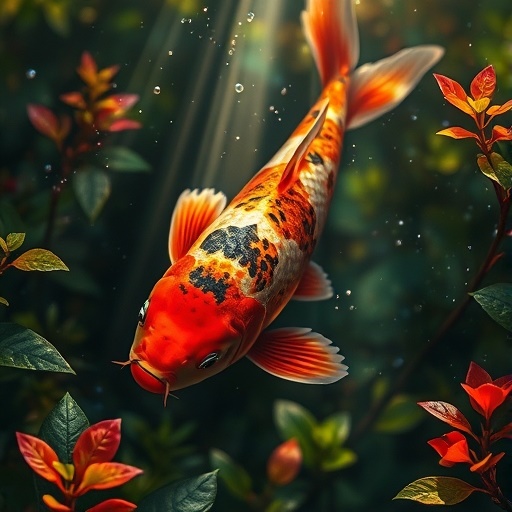The koi fish, admired for its vibrant colors and graceful movements, is not just a beautiful aquatic creature but also a profound symbol of fortune. Rooted deeply in Asian culture, particularly in Japan and China, the koi fish has long been seen as a bringer of good luck and wealth. Its cultural significance extends beyond mere aesthetics, as it represents the enduring pursuit of happiness, success, and prosperity.
The Symbolism of the Koi in Japanese Culture
In Japan, the koi fish is a powerful symbol of strength, perseverance, and transformation. Legend tells of a koi that swam up the Yellow River and, through sheer determination, leapt over the Dragon Gate waterfall, transforming into a dragon as a reward for its effort. This tale embodies the idea of overcoming obstacles to achieve greatness, making the koi a symbol of fortune and the fulfillment of one’s ambitions. In Japanese gardens, koi are often kept in tranquil ponds as a reminder of the importance of persistence and effort in achieving success.
Koi fish are also seen as symbols of good luck in the context of family and relationships. Different colors of koi are believed to bring different forms of fortune. For example, a red koi signifies love and affection, while a golden koi is said to attract financial wealth and prosperity. The koi’s ability to adapt and thrive in various environments also reinforces its association with prosperity, as it represents the potential to flourish under any circumstance.
Koi Fish and Its Role in Feng Shui
In the ancient Chinese practice of Feng Shui, koi fish are highly regarded as symbols of good fortune and positive energy. The presence of koi in one’s home or business is believed to invite wealth, health, and success. Feng Shui practitioners recommend placing koi-themed decorations or keeping live koi in ponds to attract prosperity. The koi’s swimming motion, especially when accompanied by flowing water, is thought to symbolize the continuous flow of wealth and the abundance of opportunities.
In Feng Shui, the number and color of koi are considered significant. For example, eight koi fish are thought to bring abundance and prosperity, while a single koi symbolizes the attainment of a specific goal or desire. The careful arrangement of koi and water elements is believed to create a harmonious environment, enhancing the flow of chi (positive energy) and improving the luck and fortune of those in the space.
The Koi and Its Connection to Wealth
The koi’s association with wealth is one of its most powerful symbols. In both Japan and China, the koi is often placed in business spaces, homes, and even fountains to attract financial success. The koi’s vibrant colors, especially the golden and yellow varieties, are considered auspicious and are believed to invite material wealth. Its presence in a water feature, whether indoors or outdoors, is thought to create a harmonious environment where wealth can grow and thrive, making it a popular choice for business owners and those seeking to enhance their financial fortune.
Caring for Koi to Enhance Prosperity
The act of caring for koi fish also plays a role in their symbolic value. Those who tend to their koi with care and attention are believed to attract good fortune. A well-maintained pond with healthy koi is seen as a reflection of a prosperous and thriving life. As koi are sensitive creatures that require a clean and well-balanced environment, their care is thought to symbolize a person’s ability to nurture and grow their own fortune. By providing the right conditions for koi to flourish, individuals are thought to invite the same abundance and success into their lives.
In conclusion, the koi fish remains a timeless symbol of good fortune, prosperity, and success. Its enduring symbolism across cultures highlights its universal appeal as a representation of the rewards that come with perseverance, resilience, and the continuous flow of positive energy. Whether in the home, business, or garden, the koi fish serves as a powerful reminder of the abundance that life can offer.

